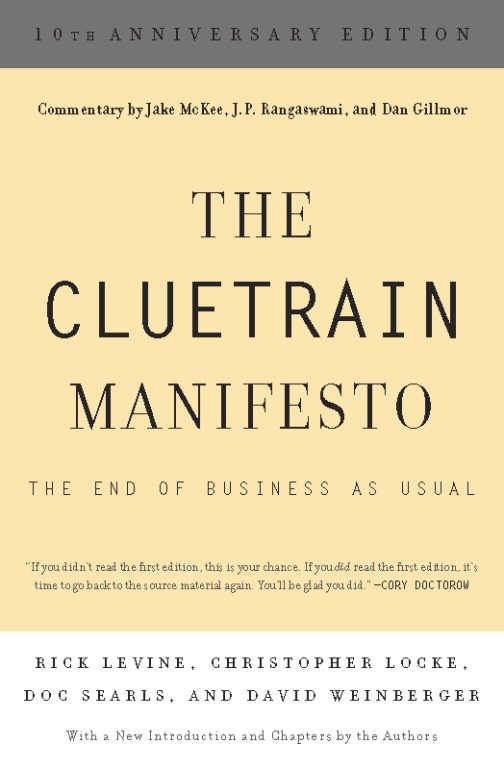
(A full online text can be found here)
For this week’s reading, we were asked to read, the cluetrain manifesto by Levine, Locke, Searls and Weinberger. To be honest, I wasn’t a huge fan. While there were some interesting parts regarding the impact on businesses, the numerous author approach hampered the development of their point and seemed to disjoint the overall narrative.
Some of the authors, especially Christopher Locke seems to be snobbish and look down at all those people who didn’t think of the internet as much of a big deal when it first began to show its uses as dialogue mediums between colleges and for the military. While he says that the first use of the internet was for unadulterated speech, he elicits a demeaning tone to those who, unlike him, may have been late adapters to the internet. One of those late comers he talks about are major corporations. Corporations he iterates, treat people as idiots when in fact they are the true idiots. He also says that with the advent of the internet, markets and commerce were blind-sided by the popularity and importance of its networks of people and cultures. The true spirit of the internet, he concludes, is the “underbelly of the web”—the sites that are user-run and free of corporate interference.
David Weinberger and Rick Levine look at the internet as a resource that has redefined our society. The web, Weinberger says, is an excellent medium and perpetuator of dialogue. Whether it is creating a discussion between communities, perpetuating ideas or as a resource for collecting information. Because of this, the web has become ingrained and essential into all parts of our life. Additionally, the way business is conducted has also been vastly and permanently changed thanks to the web. Email in particular is seen as a device that has drastically changed how businesses and corporations communicate and how news is passed around. At first, business and markets were reluctant to take commerce to the internet.
At the heart of the arguments made in the cluetrain manifesto is that the development of the internet has truly reshaped our society. It has completely changed the way we as a society conduct business, created dialogues and shared information and news. The internet, the authors conclude, should also be open to all and free from restraint (especially corporate restraint)—a utopian society.
The cluetrain manifesto was written roughly 8 years ago and in that time a lot has changed, from business on the internet to marketing, to how communication is conducted. Maybe it is because of the difference in time that I came away underwhelmed by the ‘manifesto.’



No comments:
Post a Comment